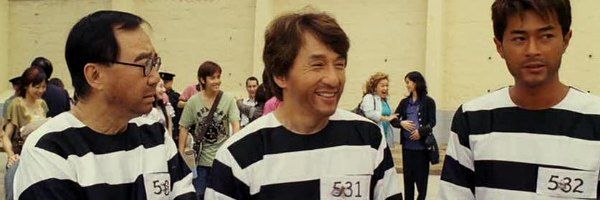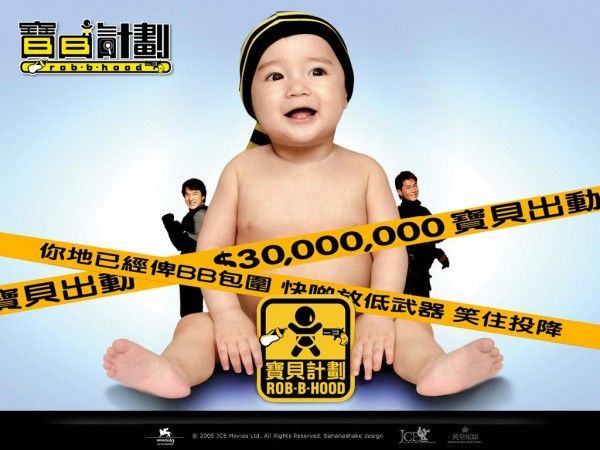Old age catches up with everyone, as any NFL fan watching Brett Favre these days can attest to. Rarely has that truth appeared more painful than in the latter-day efforts of Jackie Chan. His spirit remains willing, but the death-defying acrobatics that made him an international superstar have slowly slipped out of his grasp… regardless of how hard films like Robin-B-Hood try to convince us otherwise. Hit the jump for my full review.
If you haven’t heard of the film, that’s no surprise. Released in 2006, it has operated largely below the radar, and only Chan’s biggest fans know about it. A quick look at the film makes it easy to see why. This time around, Jackie plays an expert thief and safecracker who lands big scores only to blow them all at the local gambling dens. Salvation appears when he and his partners kidnap a baby at the behest of a dodgy underworld boss. They end up bonding with the child to the point where they fight on his behalf against the very criminals who tasked them with the kidnapping in the first place.
Had he made it ten years earlier, Chan might have sold us on it. His comic timing remains undimmed , and with long-time collaborator Benny Chan behind the camera, comes up with a fair amount of imaginative choreography to indulge in. A thirty- or forty-year-old Chan would have eaten it all for lunch, astonishing us with his “no stuntmen, no ropes” ethos and the sweaty-palmed thrills it engenders. Alas, he is no longer the man he was, necessitating the use of cheap tricks and special effects to sell us on a number of the gags. Once they click into place--once you sense the wire work and the green screens--the magic vanishes, replaced by utter banality.
As if aware of its increasingly threadbare nature, Robin-B-Hood spaces the action out in favor of more traditional jokes and character development. Here too, Chan feels out of step, playing a less-than-likeable character in his usual likeable manner. We struggle to accept him as a degenerate gambler and while his eventual change of heart supposedly redeems him, the arc feels supremely phony. The director pads it with stock gross-out moments, scenes of the kidnappers struggling with basic baby-caring tasks, and a few heated conversations with Chan’s family. They slow the proceedings to a crawl, leaving the audience wondering when the next big stunt will arrive. When it does, it inevitably proves to be a letdown and the whole cycle starts all over again.
Unlike some of Chan’s other movies, Robin-B-Hood aims squarely at the family market, with comparatively gentle thrills and some too-obvious lessons of the Crime Doesn’t Pay variety. It never descends into the flat-out awful--just a little dull--and even as he ages, Chan’s onscreen presence remains formidable. Sadly, that may no longer be enough. Without a sharper script, he has to rely solely on abilities he no longer possesses, a process which becomes supremely depressing after awhile. The lengthy running time further gnaws at our interest levels, such that even the bevy of appearances from Hong Kong staples like Yuen Biao can’t improve matters. It’s not the worst film Chan’s ever done; it just reminds you of how much better he can be… or at least used to be. Robin-B-Hood deserves some credit for trying to let its star branch out a bit. It needed to go a lot further, or--if it couldn’t--to do what it does with a lot more conviction.


